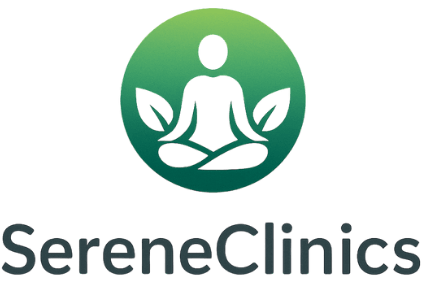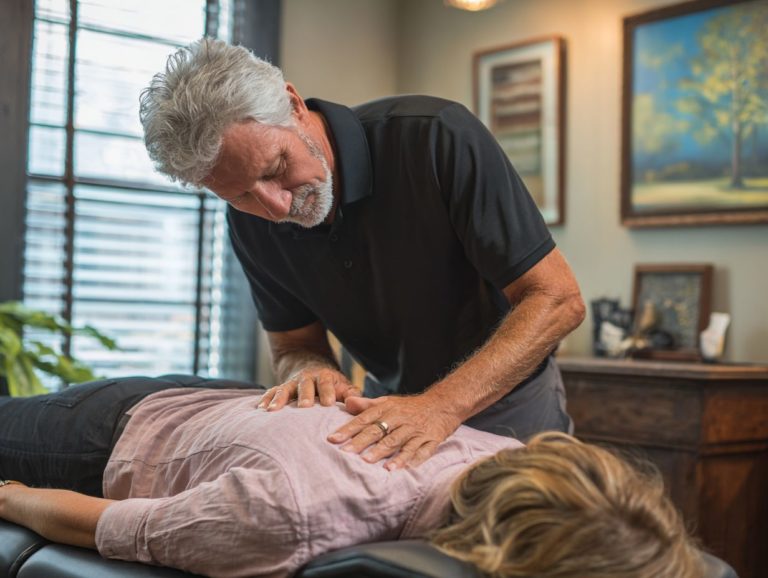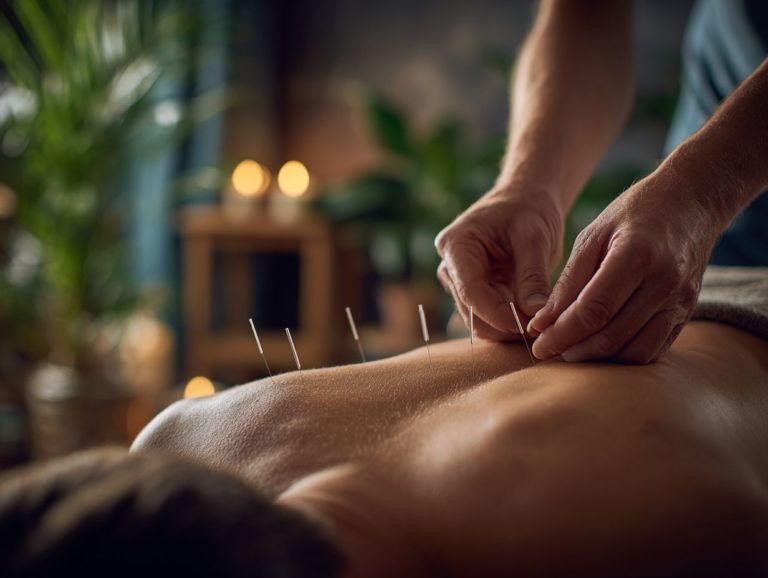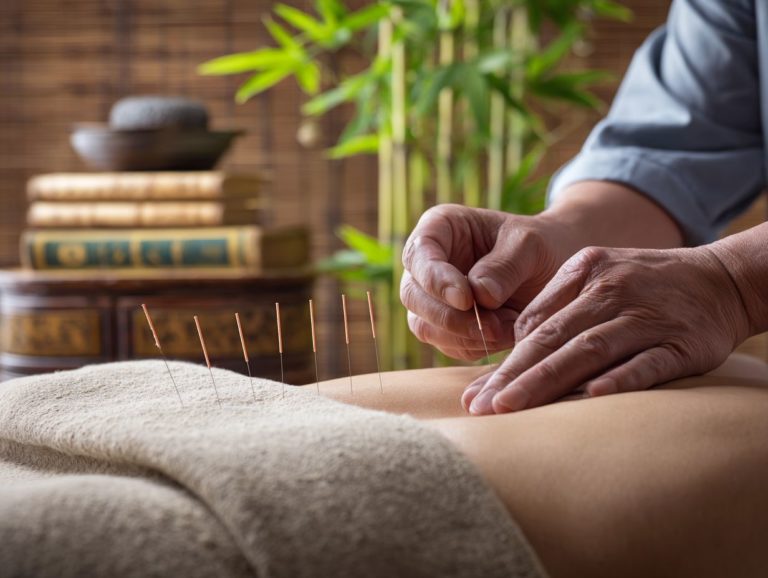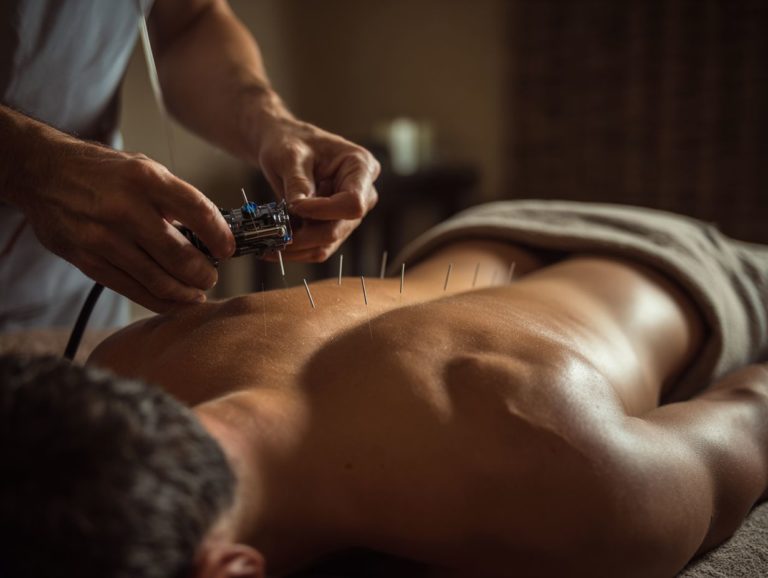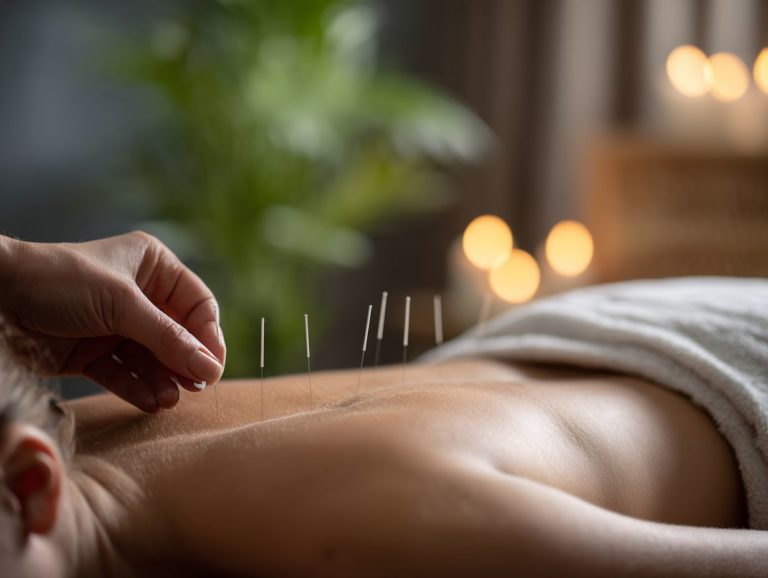How to Prepare for Acupuncture: Practical Guide for Patients
Acupuncture, an ancient healing technique rooted in Traditional Chinese Medicine, has become well-known for its overall health benefits.
This practice provides many advantages, including effective pain relief, stress reduction, and enhanced mental health.
If you’re considering a session, here’s what to expect, how to prepare, and what to do afterward to maximize your experience.
Whether you’re new or have been a patient for a long time, knowing these details will improve your experience towards better health.
Key Takeaways:
Contents
- 1 What are the Benefits of Acupuncture?
- 2 Acupuncture Usage and Trends
- 2.1 Acupuncture Patient Statistics: Acupuncture Adoption
- 2.2 Acupuncture Patient Statistics: Pain Management with Acupuncture
- 2.3 Acupuncture Patient Statistics: Acupuncture Safety
- 2.4 Acupuncture Patient Statistics: Acupuncture Usage Growth
- 2.5 1. Pain Relief
- 2.6 2. Stress Reduction
- 2.7 3. Improved Immune System
- 2.8 4. Improved Mental Health
- 3 What to Expect During an Acupuncture Session?
- 4 How to Prepare for an Acupuncture Session?
- 5 What to Do After an Acupuncture Session?
- 6 Frequently Asked Questions
- 6.1 What is acupuncture and how can it benefit me?
- 6.2 How should I prepare for my first acupuncture appointment?
- 6.3 Are there any medications or supplements I should avoid before acupuncture?
- 6.4 What should I expect during an acupuncture session?
- 6.5 Is there anything I should do after my acupuncture appointment?
- 6.6 How often should I schedule acupuncture appointments and for how long?
What are the Benefits of Acupuncture?
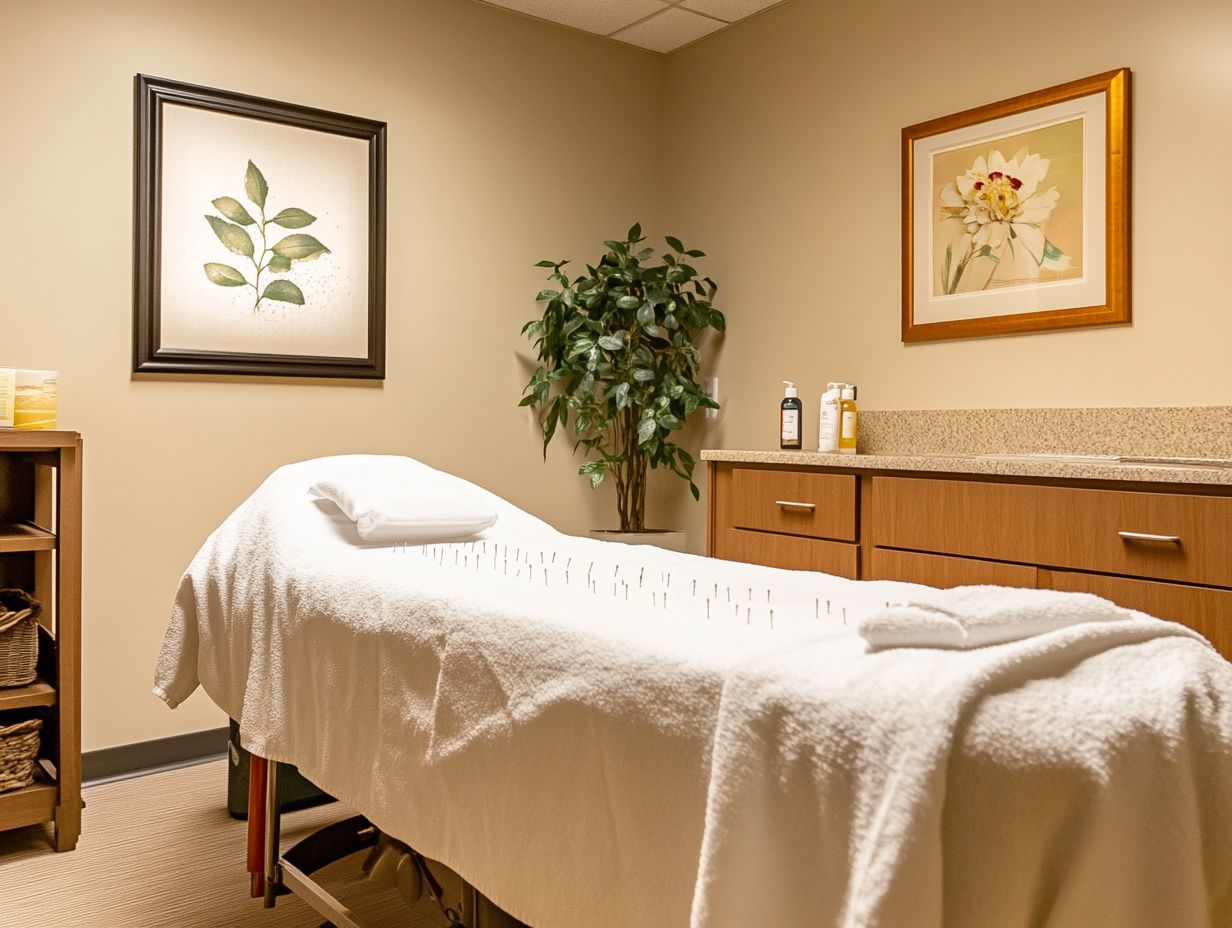
Acupuncture, an important part of traditional Chinese medicine, does more than relieve pain; it supports general health.
This practice involves placing needles at specific points known as meridians to reduce stress, improve brain function, and strengthen the immune system.
Acupuncture helps with mental health, providing a treatment option for various conditions and encouraging changes in daily habits that aid in recovery. As mentioned in our exploration of manual acupuncture techniques, these methods also contribute significantly to the treatment’s effectiveness.
Acupuncture Usage and Trends
The increasing acceptance of acupuncture in Western medicine is evident from recent studies published by sources like Time, which highlights its mainstream adoption due to its health benefits.
Acupuncture Usage and Trends
Acupuncture is increasingly being recognized for its health benefits and integration into mainstream medicine. This is further emphasized by research highlighted by Time, which suggests a growing acceptance in medical circles, driven by extensive studies on its effectiveness. If you’re interested in exploring holistic health practices, you might find our insights into Homeopathy: Principles, Practices, and Evidence-Based Integration enlightening.
Acupuncture Patient Statistics: Acupuncture Adoption
Acupuncture Patient Statistics: Pain Management with Acupuncture
Acupuncture Patient Statistics: Acupuncture Safety
Acupuncture Patient Statistics: Acupuncture Usage Growth
The data on Acupuncture Usage and Trends provides useful details about the increase and use of acupuncture as a way to treat pain, focusing on its effectiveness and safety. The statistics indicate a significant global and domestic uptake of acupuncture practices, reflecting a shift in healthcare preferences towards alternative medicine.
Acupuncture Adoption reveals that acupuncture is utilized in 79.8% of countries, indicating widespread acceptance and integration into varied healthcare systems. In the United States, there’s an evident increase in acupuncture adoption among adults, rising from 1.0% in 2002 to 2.2% in 2022. This growth suggests increasing awareness and trust in acupuncture’s efficacy and benefits.
- Pain Management with Acupuncture: The data shows that acupuncture has gained traction primarily for pain management, with the percentage of U.S. users employing it for this purpose growing from 55.0% in 2002 to 72.0% in 2022. This indicates a shift towards non-pharmaceutical pain management solutions, possibly due to rising concerns over medication side effects and the opioid crisis.
Acupuncture Safety data highlights the relative safety of acupuncture treatments. Minor adverse events occur in approximately 7.97% to 8.6% of consultations, according to different studies, with serious adverse events being extremely rare, at a rate of 0.0008%. The rare occurrence of serious problems makes acupuncture a trustworthy and attractive choice for safe treatment.
Acupuncture Usage Growth reflects a 120% increase in the number of U.S. adult users from 2002 to 2022, with 7.3 million users in 2022. This growth pattern highlights acupuncture’s growing presence in regular healthcare and indicates wider approval from doctors and patients.
Overall, the data highlights acupuncture’s increasing role and recognition in healthcare worldwide and in the U.S. Acupuncture effectively manages pain with few side effects, and it is expected to become more popular as an additional treatment option. This trend shows a larger change in culture towards complete and combined health methods, providing important chances for doctors, scientists, and healthcare workers. As more people become interested, more studies and adoption into standard medical practices could improve how easy it is to get and how well acupuncture treatments work.
1. Pain Relief
One of the most notable benefits of acupuncture is its effectiveness in providing pain relief for various conditions, including orthopedic injuries and sports injuries.
This ancient practice reduces discomfort by targeting certain areas on the body.
By balancing the flow of qi, or life energy, acupuncture helps people relax and greatly eases stress. When needles are placed in the body, they trigger the release of endorphins. These are natural substances that help reduce pain, making the therapy work better.
This method in alternative medicine helps improve health by focusing on both physical and emotional aspects of pain, making it a popular choice for those looking for complete treatment.
Such benefits highlight acupuncture’s role in alternative therapies for a wide range of ailments.
2. Stress Reduction
Acupuncture is widely recognized for its ability to reduce stress and promote relaxation, offering an effective method to manage anxiety and tension.
This ancient practice uses fine needles to stimulate specific points on the body, encouraging a state of tranquility that is essential for emotional well-being.
By practicing relaxation methods like deep breathing during treatments, individuals can make acupuncture even more calming.
This method deals with physical symptoms and promotes a view that values patient-focused care for reaching the best health outcomes.
As patients experience these combined benefits, they often find that their overall resilience against stress improves significantly, leading to a more balanced and harmonious life.
3. Improved Immune System
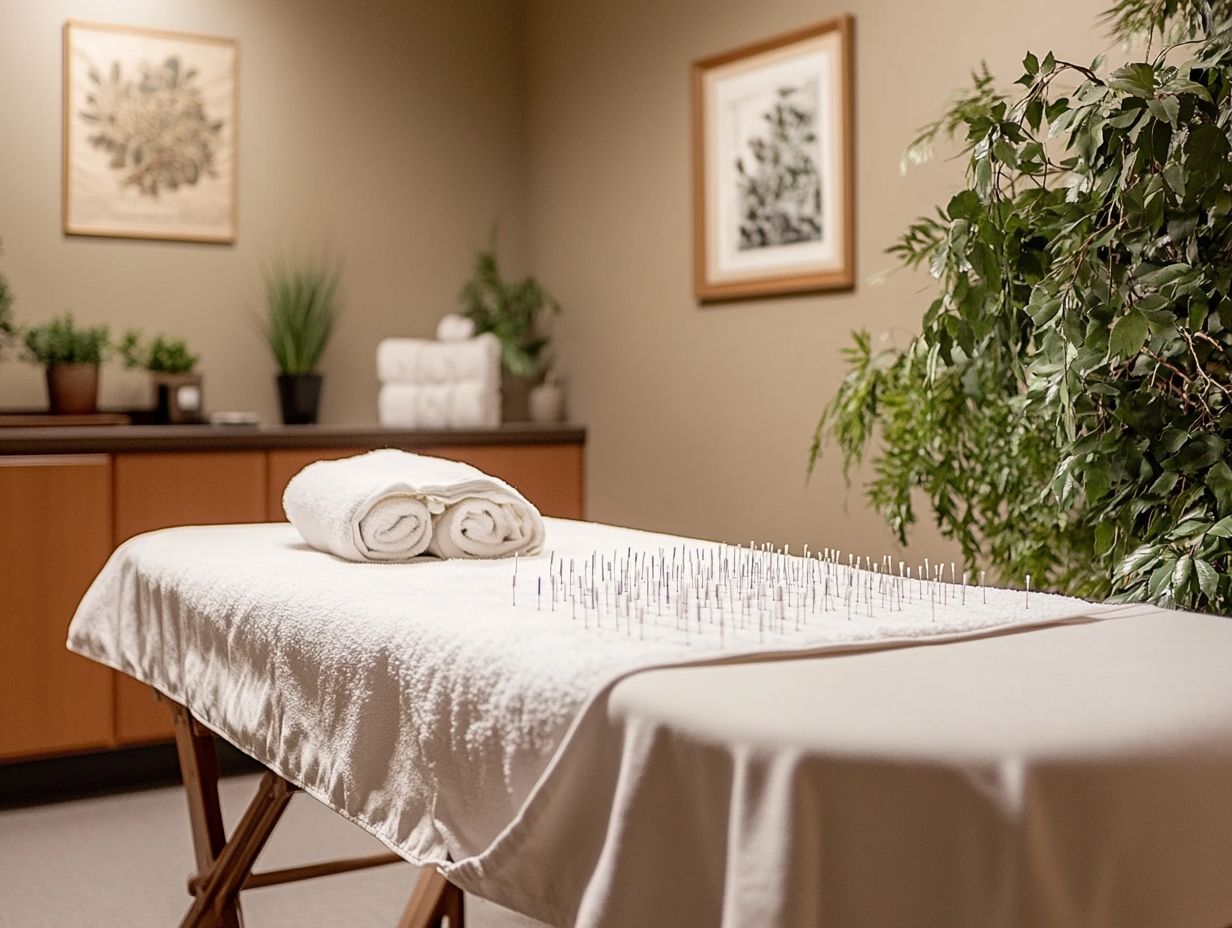
Regular acupuncture sessions have been associated with improvements in the immune system, enhancing the body’s ability to ward off illnesses and promoting overall health.
This traditional practice helps manage Qi, or life energy, which is important for maintaining the body’s balance.
When this energy flows freely through the meridians, it can significantly strengthen one’s defenses against pathogens. Acupuncture is often used together with a complete plan that includes herbal treatments and dietary advice to help the immune system.
Certain acupuncture points can increase the creation of white blood cells and improve blood flow, which is important during cold and flu seasons. Using a thorough approach that combines acupuncture with these supportive actions can strengthen the immune system, as highlighted in research from Frontiers in Immunology.
4. Improved Mental Health
Acupuncture is increasingly recognized for its role in enhancing mental health, facilitating improvements in emotional health and cognitive functioning.
This old method, based on overall health ideas, focuses on personal care by addressing each person’s specific needs.
By targeting certain areas on the body, acupuncture helps you relax, which is important for lowering stress and creating a feeling of calmness.
When stress decreases, people often notice their ability to handle emotions improves, which results in better ways to manage challenges and an overall improvement in health.
Studies indicate that acupuncture can lessen symptoms of anxiety and depression, making it a helpful part of treating various mental health conditions.
By including acupuncture in a complete health care plan, people can see big benefits in their mental and emotional well-being.
What to Expect During an Acupuncture Session?
An acupuncture visit generally follows a few main steps.
- It starts with a detailed conversation with the acupuncturist to go over your medical background and talk about your treatment goals for customized care.
- In this talk, the acupuncturist will look into your health issues, check any conditions, and explain how acupuncture methods can help you.
- The session then moves on to placing needles in certain spots to improve energy movement, then adjusting the needles and giving time to rest for relaxation and healing.
1. Consultation with Acupuncturist
Talking with your acupuncturist is an important first step, where you can discuss your medical history and health issues in detail.
In this discussion, clear communication is important because it helps build a trusting relationship and makes sure the treatment plan is adjusted to fit the person’s needs.
When patients openly share their experiences and preferences, the practitioner can adopt a patient-centered care approach, incorporating both physical and emotional aspects of health. This method considers all factors influencing health, making the treatment work better and aligning it with the patient’s goals.
Having open conversations creates a base for success in the recovery process.
2. Needle Insertion
Needle insertion is a fundamental aspect of acupuncture, where thin acupuncture needles are strategically placed along the meridians to facilitate energy flow and promote healing.
This careful procedure deals with physical issues and works to improve emotional health and general energy. Practitioners prioritize safety by using sterilized, single-use needles, thereby minimizing the risk of infection and ensuring patient comfort.
To further reduce discomfort, various relaxation techniques, such as deep breathing exercises and guided visualization, are often employed prior to treatment. Knowing how energy flows in the body, placing needles in specific spots can bring about significant healing results, helping the body return to balance and reduce stress well.
3. Needle Manipulation
Needle handling is a method used during acupuncture sessions to improve treatment results, with the acupuncturist moving the needles to improve energy movement.
This practice helps control Qi and encourages deep relaxation, letting patients feel calm and healthy.
Through various methods such as lifting, thrusting, and rotating the needles, practitioners can manipulate the body’s energy pathways more effectively. Each technique serves a particular purpose, whether it’s to invigorate stagnant energy, alleviate pain, or encourage healing.
By effectively using these methods, acupuncturists can improve health more completely, promoting a balance that is important for the best recovery and general well-being.
4. Resting with Needles in Place
After needle insertion, patients are typically encouraged to rest with the needles in place for a designated period, allowing for deep relaxation and healing.
This important break gives the body time to fully gain the benefits of acupuncture by taking in the treatment’s effects.
During this time, people can try relaxation methods like deep breathing or mindfulness, which improve the benefits after treatment.
By creating a feeling of calm and peace, patients experience the physical benefits of acupuncture and support mental health improvements.
By combining body and mind, this method makes the effects of the treatment last longer and have a powerful effect, helping you feel better overall.
How to Prepare for an Acupuncture Session?
Getting ready for an acupuncture appointment is important to make the treatment work well and feel comfortable. Before the session, patients should follow some key tips.
- Wear loose clothes for easy access to acupuncture points.
- Avoid caffeine and alcohol to help with relaxation.
- Having a small meal before can help you feel better and make the session easier.
1. Research the Acupuncturist
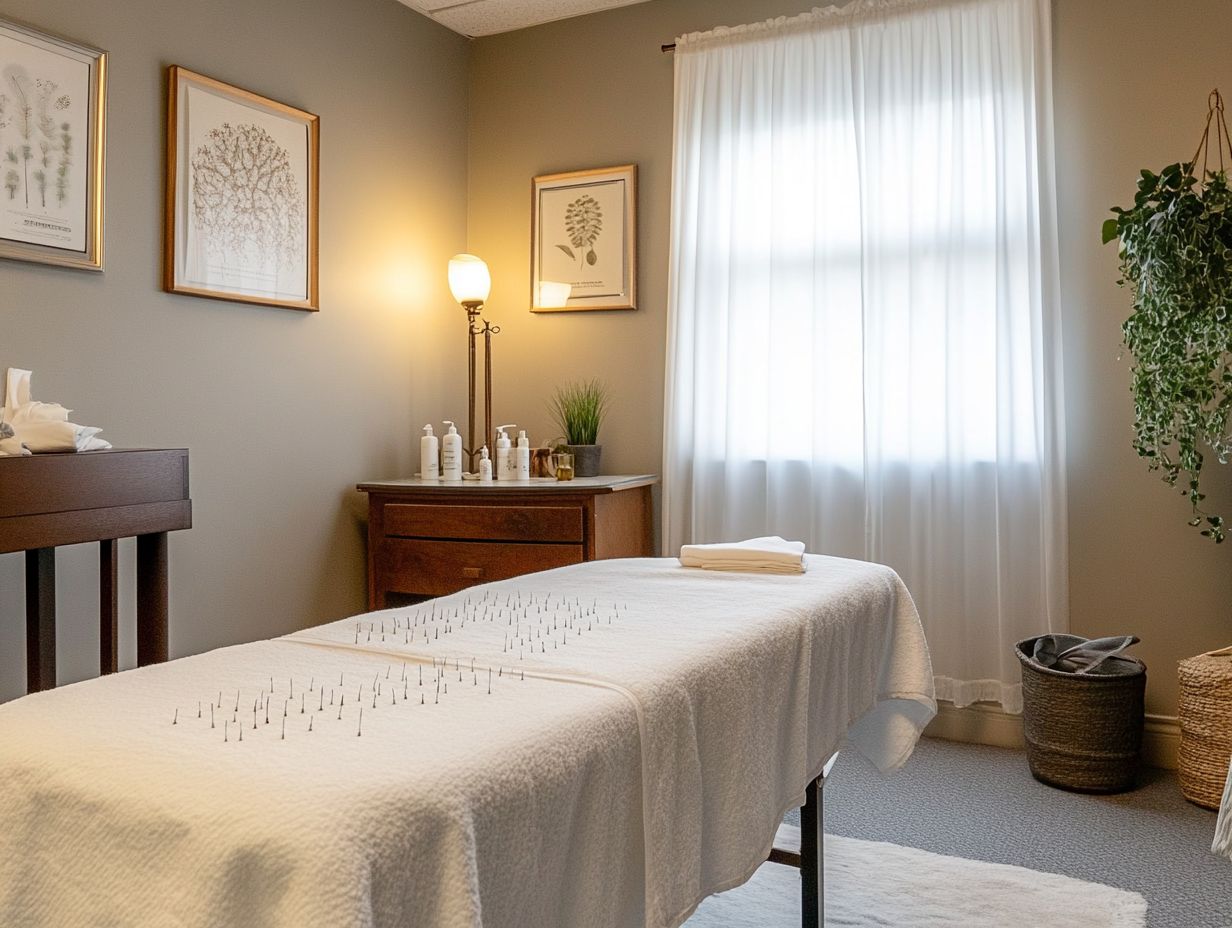
Before going to an acupuncture session, research the acupuncturist to make sure they have the necessary skills and experience.
This step is important for the treatment to work properly and for keeping the patient safe and healthy.
A reputable acupuncturist will have proper certifications, ideally from recognized institutions in traditional Chinese medicine, ensuring their training meets high standards.
By checking the practitioner’s qualifications, people can learn about their commitment to focusing on each patient’s specific needs.
It’s a good idea to ask about the clinic’s safety practices, such as using sterile needles and following hygiene rules, to have a safe and thorough health experience.
2. Wear Comfortable Clothing
Wearing loose and comfortable clothing is important when getting ready for an acupuncture session, as it helps the acupuncturist reach the points on your body where the needles need to go.
In addition, the choice of clothing can significantly influence the overall treatment experience, contributing to relaxation promotion that is essential for positive therapeutic outcomes.
When patients feel at ease in their attire, they are more likely to unwind, allowing for deeper relaxation throughout the acupuncture session. This comfort improves access to key areas of the body and makes the treatment more effective.
Wearing suitable clothing can significantly increase the benefits of acupuncture, ensuring that each part of the session supports your health improvement.
3. Avoid Caffeine and Alcohol
To improve treatment results, avoid caffeine and alcohol before your acupuncture session because they can affect the body’s natural energy flow.
This interference affects the complex energy routes that acupuncture tries to balance, reducing the healing effects of the treatment.
By avoiding these substances, a person can promote overall health. Avoiding caffeine and alcohol allows the body to maintain a more stable and relaxed state, which can lead to improved outcomes during the session.
These steps make sure that herbal interactions work well, as these substances can interfere with the herbs used with acupuncture, improving the treatment’s effectiveness.
4. Eat a Light Meal Beforehand
Eating a light meal before an acupuncture session is important for minimizing discomfort and facilitating a more effective treatment experience.
This method can greatly improve the experience by reducing nausea and encouraging a calm state during and after the session.
When patients focus on their eating habits and timing, they often experience increased energy and improved health after treatment.
Incorporating gentle, easily digestible foods allows individuals to maintain a sense of comfort, which is essential for engaging in effective relaxation techniques.
This care approach focuses on the patient and emphasizes overall health. It ensures that all aspects, including diet and treatment, are coordinated to achieve the best health results.
What to Do After an Acupuncture Session?
After an acupuncture session, patients can feel various positive effects. To get the most out of these benefits, it’s important to follow some simple steps.
- Drinking a lot of water helps remove any toxins released during the treatment and keeps you hydrated.
- Resting and relaxing can help the body to heal and take in the advantages of acupuncture.
1. Drink Plenty of Water
Drinking plenty of water after an acupuncture session is essential for promoting hydration and supporting the body’s natural healing processes.
When someone takes part in this complete health activity, the body experiences different changes that help remove toxins. By drinking fluids, people help remove these waste products, which is important for keeping energy processes working well.
Drinking enough water helps remove toxins and supports your health by improving blood flow and lowering tiredness. Drinking enough water can greatly help with managing stress, allowing the body to recover faster after treatment.
Drinking enough water after exercising is a basic but important way to support your health and energy.
2. Rest and Relax
Resting and relaxing after an acupuncture session helps the body take in the treatment’s effects.
Spending time in silence is essential for looking after your mental and emotional health.
Engaging in relaxation techniques such as deep breathing can further facilitate this restorative process, allowing the mind to unwind and release accumulated stress.
Research indicates that getting enough sleep improves mood and mental performance, so it is important to consider overall health.
Incorporating gentle stretching or mindful meditation during this time can deepen the sense of tranquility, promoting a balanced state of mind and enhancing the overall effects of the acupuncture experience.
3. Avoid Strenuous Activities
After an acupuncture session, it’s advisable to avoid strenuous activities to allow your body to benefit fully from the treatment.
Intense physical activity can disturb the energy balance that acupuncture tries to improve, possibly reducing the benefits of the treatment. Instead, focusing on gentle activities or rest can greatly help reduce discomfort and promote proper healing.
This approach to care focuses on the importance of listening to your body after treatment, as the harmony achieved by acupuncture can be affected by excessive activity.
When people take enough time to rest, they can make the most of the healing process, leading to better results overall.
4. Follow Any Post-Treatment Instructions
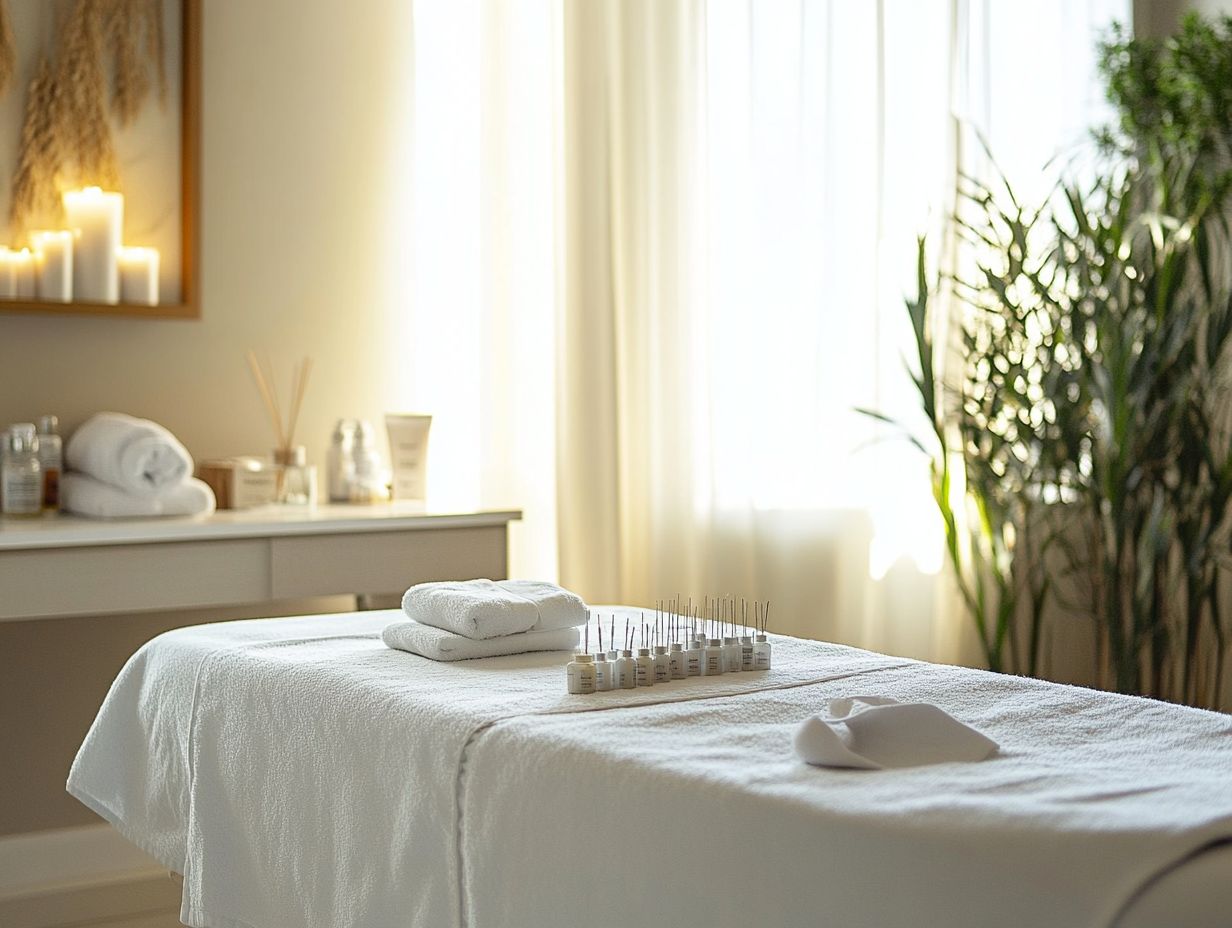
Following the instructions given by your acupuncturist after treatment is important for getting the most out of your acupuncture session and improving your recovery.
These rules often involve changes to daily habits and calming methods to keep the body in a condition that supports recovery.
Following specific care instructions helps with quick recovery and supports lasting health, which is a key part of overall well-being.
By integrating practices such as meditation or gentle stretching as advised by their acupuncture practitioners, individuals can improve their overall well-being.
Using both methods encourages relaxation and keeps the balance reached during treatment, resulting in improved health and a more fulfilling experience.
Frequently Asked Questions
What is acupuncture and how can it benefit me?
Acupuncture is a form of traditional Chinese medicine that involves inserting thin needles into specific points on the body to promote healing and improve overall well-being. It can help with a variety of health issues, such as pain, stress, and digestive problems.
How should I prepare for my first acupuncture appointment?
Before your appointment, it’s important to eat a light meal and avoid consuming caffeine or alcohol. Also, wear loose-fitting and comfortable clothing to allow for easy access to points on your body.
Are there any medications or supplements I should avoid before acupuncture?
It’s recommended to avoid blood thinners, such as aspirin, and any herbal supplements that may affect blood clotting. Talk to your acupuncturist before your appointment about any medicines or supplements you use.
What should I expect during an acupuncture session?
During an acupuncture session, your acupuncturist will first take a detailed health history and then insert thin needles into specific points on your body. You may feel a slight sensation, but it should not be painful. You will then rest for about 20-30 minutes with the needles in place, after which they will be removed and you can go about your day.
Is there anything I should do after my acupuncture appointment?
It’s important to drink plenty of water and take it easy after your acupuncture session. Also, try to avoid strenuous activities or consuming alcohol for the rest of the day to allow your body to fully benefit from the treatment.
How often should I schedule acupuncture appointments and for how long?
The frequency and duration of your acupuncture treatment will depend on your specific condition and response to the treatment. Typically, weekly or bi-weekly sessions are recommended for the best results. Your acupuncturist will work with you to create a specific treatment plan that meets your needs.

Sheetal Sharda has a background in CS. She got an interest in Holistic living back in 2018, and has since started exploring more into Naturapathy, Holistic Living, Yoga, and more. She got inspired to start SereneClinics to help people find reliable centers across the world.
